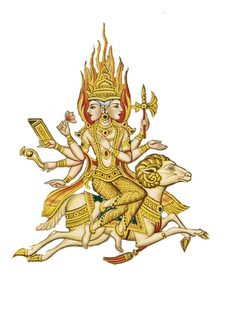The Rigveda
 The Rigveda is a collection of Sanskrit hymns, likely composed 1700-1100 BCE. The more than 1,000 verses of the Rigveda praise the multiple gods of the early Vedic religion, and most were likely used during ritual sacrifice. The vedas name Greek, Latin, and Persian gods, suggesting that the disparate religions underwent an evolution from an earlier common religion. The vedas were preserved by an oral tradition until the advent of the printing press. The Rigveda is generally interepreted symbollically by contemporary Hindus, rather than used for ritual chanting. It is viewed as a piece of transcendental literature. The following is the first hymn of the Rigveda, directed toward Agni, the god who represents fire.
The Rigveda is a collection of Sanskrit hymns, likely composed 1700-1100 BCE. The more than 1,000 verses of the Rigveda praise the multiple gods of the early Vedic religion, and most were likely used during ritual sacrifice. The vedas name Greek, Latin, and Persian gods, suggesting that the disparate religions underwent an evolution from an earlier common religion. The vedas were preserved by an oral tradition until the advent of the printing press. The Rigveda is generally interepreted symbollically by contemporary Hindus, rather than used for ritual chanting. It is viewed as a piece of transcendental literature. The following is the first hymn of the Rigveda, directed toward Agni, the god who represents fire. Agni
I Laud Agni, the chosen Priest, God, minister of sacrifice,
The hotar, lavishest of wealth.
Worthy is Agni to be praised by living as by ancient seers.
He shall bring hitherward the Gods.
Through Agni man obtaineth wealth, yea, plenty waxing day by day,
Most rich in heroes, glorious.
Agni, the perfect sacrifice which thou encompassest about
Verily goeth to the Gods.
May Agni, sapient-minded Priest, truthful, most gloriously great,
The God, come hither with the Gods.
Whatever blessing, Agni, thou wilt grant unto thy worshipper,
That, Agniras, is indeed thy truth.
To thee, dispeller of the night, O Agni, day by day with prayer
Bringing thee reverence, we come
Ruler of sacrifices, guard of Law eternal, radiant One,
Increasing in thine own abode.
Be to us easy of approach, even as a father to his son:
Agni, be with us for our weal.
Agni receives much attention in the Rigveda--only slightly less than Indra, who is the ruler of the gods. And he is the first god mentioned in the Rigveda. It seems strange that a lesser god would be mentioned and praised before Indra, but one must remember that most of the hymns involved ritual sacrifice--Agni consumed the sacrifice and carried it to the gods. It only makes sense that Agni should be called first. Agni is also the god who brings light and rids darkness, he is the illuminator, allowing man to see his path clearly and enabling him to reach an understanding of the Supreme Being. The wealth that man may obtain is happiness, during life and after death, gained by making choices in the interest of his spiritual and material well-being. Thus, Agni can symbolize the willingness of the mind to embrace divinity and shed self-love, the darkness that weighs the soul.
The image above represents the god Agni, his two heads representing his power to nourish and destroy, and his many arms are rays of light streaming from his body. The image was found in a gallery of the Hindu gods here.

0 Comments:
Post a Comment
<< Home